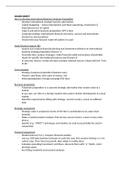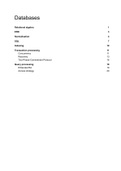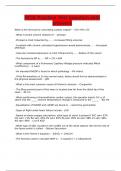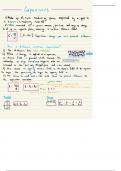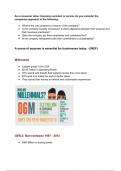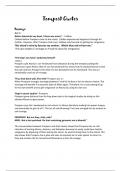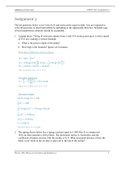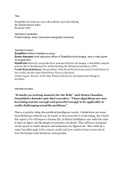Early Psychology
● Aims of Psychology (for the human mind and behavior):
- Describe
- Predict
- Explain
- Control
● Every aspect of personality and intellectual ability reflects the combined impact of genes
and experience (nature and nurture).
*Neural Plasticity: The mechanisms by which the brain changes as a result of experience.
- Learning causes new brain connections to be formed.
Wilhelm Wundt (Introspection):
● Wundt and his team trained themselves to carefully observe their own thoughts, feelings,
and experiences.
*Introspection: The examination or observation of one’s own mental processes.
● Introspection was a failure because the observations of their mental activity were biased
by their expectations.
- Introspection is no longer considered a valid piece of evidence in psychology as
observations are subjective and cannot be replicated. It is impossible for multiple
scientists to be able to observe the internal mental processes of a given person
and make the same observations.
Sigmund Freud (Psychodynamic Theory):
● Freud created the psychodynamic theory, wherein he believed that different mental
entities interact with each other and influence behavior and personality.
- Id (Unconscious): Represents basic desires and instincts
- Superego (Unconscious): Represents moral values
- Ego (Conscious): Represents rational part of the mind; tries to balance the
impulses of the Id and the morality of the Superego
● The competition between the Id, Superego, and Ego can be seen in unconscious
behavior like dreams, slips of the tongue, etc.
*Freudian Slip: A speech error that reveals unconscious thoughts (reveals the hidden desires of
the Id).
, ● The problem with Freud’s psychodynamic theory was that there was no way to
determine whether the ideas were right or wrong.
- Freud could explain everything after it had happened, but couldn’t predict
anything before it happened.
- Freud’s theory wasn’t testable, and therefore wasn’t scientific.
*Scientific Theory: A theory that can either be proved or disproved.
● Freud’s approach to psychology also shed light on the problem of introspection, meaning
the data researchers used to support their theories could easily be biased by their own
expectations.
Clever Hans (Experimenter Expectation Effects):
● The case of Clever Hans shows how an experimenter might unconsciously influence the
behavior of a research subject to give the desired answer to a question.
- Clever Hans, the horse, learned to stop tapping his foot based on subtle,
unconscious facial expressions from his owner. As Hans approached the correct
answer, the owner's expression would grow more tense, and once Hans reached
the right number, the owner's face would relax.
- Psychologist Oskar Pfungst discovered that if the owner was unaware of the
answer, Hans would continue tapping without stopping, revealing that the horse
was responding to the owner’s involuntary signals rather than understanding the
questions.
● Psychologists tend to distrust data collected from participants who are interacting directly
with an experimenter who knows the hypothesis that’s being tested.
- This is because there is too much opportunity for unconscious biases to influence
the data.
Edward Thorndike (Behavioral Psychology):
● Thorndike’s experiment determined that behaviors produced are controlled by whether
those behaviors have been previously rewarded or punished.
- Thorndike placed a hungry cat inside a puzzle box with a lever that, when
pressed, would open the door and allow the cat to escape. Initially, the cat paid
no attention to the lever, but accidentally, it eventually stepped on it and freed
itself to reach the food outside. After repeating the experiment multiple times, the
cat gradually learned to press the lever more quickly to escape and eat.
Thorndike concluded that the only way the cat would learn to press the lever was
by conducting several trials, with the reward of food reinforcing the behavior.
, *Conditioning: Repeated experience with a given behavior being rewarded or punished
conditions an organism to behave in a way that fits with the environment that is doing the
rewarding or punishing.
● Cognitive psychologists believed it was possible to study something unobservable by
looking at its effects on things that can be observed, meaning mental processes could be
studied by looking at their effects on behavior.
*Bystander Apathy: People see a crime or other problem and do nothing to help.
- The case of Kitty Genovese showed that in spite of witnesses being present when Kitty
was attacked and then murdered, no one bothered to help.
● Aims of Psychology (for the human mind and behavior):
- Describe
- Predict
- Explain
- Control
● Every aspect of personality and intellectual ability reflects the combined impact of genes
and experience (nature and nurture).
*Neural Plasticity: The mechanisms by which the brain changes as a result of experience.
- Learning causes new brain connections to be formed.
Wilhelm Wundt (Introspection):
● Wundt and his team trained themselves to carefully observe their own thoughts, feelings,
and experiences.
*Introspection: The examination or observation of one’s own mental processes.
● Introspection was a failure because the observations of their mental activity were biased
by their expectations.
- Introspection is no longer considered a valid piece of evidence in psychology as
observations are subjective and cannot be replicated. It is impossible for multiple
scientists to be able to observe the internal mental processes of a given person
and make the same observations.
Sigmund Freud (Psychodynamic Theory):
● Freud created the psychodynamic theory, wherein he believed that different mental
entities interact with each other and influence behavior and personality.
- Id (Unconscious): Represents basic desires and instincts
- Superego (Unconscious): Represents moral values
- Ego (Conscious): Represents rational part of the mind; tries to balance the
impulses of the Id and the morality of the Superego
● The competition between the Id, Superego, and Ego can be seen in unconscious
behavior like dreams, slips of the tongue, etc.
*Freudian Slip: A speech error that reveals unconscious thoughts (reveals the hidden desires of
the Id).
, ● The problem with Freud’s psychodynamic theory was that there was no way to
determine whether the ideas were right or wrong.
- Freud could explain everything after it had happened, but couldn’t predict
anything before it happened.
- Freud’s theory wasn’t testable, and therefore wasn’t scientific.
*Scientific Theory: A theory that can either be proved or disproved.
● Freud’s approach to psychology also shed light on the problem of introspection, meaning
the data researchers used to support their theories could easily be biased by their own
expectations.
Clever Hans (Experimenter Expectation Effects):
● The case of Clever Hans shows how an experimenter might unconsciously influence the
behavior of a research subject to give the desired answer to a question.
- Clever Hans, the horse, learned to stop tapping his foot based on subtle,
unconscious facial expressions from his owner. As Hans approached the correct
answer, the owner's expression would grow more tense, and once Hans reached
the right number, the owner's face would relax.
- Psychologist Oskar Pfungst discovered that if the owner was unaware of the
answer, Hans would continue tapping without stopping, revealing that the horse
was responding to the owner’s involuntary signals rather than understanding the
questions.
● Psychologists tend to distrust data collected from participants who are interacting directly
with an experimenter who knows the hypothesis that’s being tested.
- This is because there is too much opportunity for unconscious biases to influence
the data.
Edward Thorndike (Behavioral Psychology):
● Thorndike’s experiment determined that behaviors produced are controlled by whether
those behaviors have been previously rewarded or punished.
- Thorndike placed a hungry cat inside a puzzle box with a lever that, when
pressed, would open the door and allow the cat to escape. Initially, the cat paid
no attention to the lever, but accidentally, it eventually stepped on it and freed
itself to reach the food outside. After repeating the experiment multiple times, the
cat gradually learned to press the lever more quickly to escape and eat.
Thorndike concluded that the only way the cat would learn to press the lever was
by conducting several trials, with the reward of food reinforcing the behavior.
, *Conditioning: Repeated experience with a given behavior being rewarded or punished
conditions an organism to behave in a way that fits with the environment that is doing the
rewarding or punishing.
● Cognitive psychologists believed it was possible to study something unobservable by
looking at its effects on things that can be observed, meaning mental processes could be
studied by looking at their effects on behavior.
*Bystander Apathy: People see a crime or other problem and do nothing to help.
- The case of Kitty Genovese showed that in spite of witnesses being present when Kitty
was attacked and then murdered, no one bothered to help.


